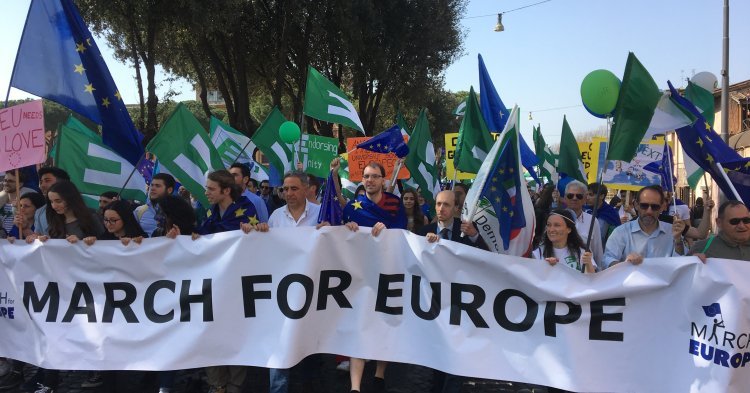Let me start with a personal story.
Some years ago, when I lived in Düsseldorf – where I study social sciences – my grandmother and I had the routine to talk on the phone once the week. ‘Germany won the Nobel Peace Prize’, she said proudly. ‘Uh? The EU, you mean?’ ‘No, Germany.’ ‘I’m sorry, grandma. You’re wrong.’ ‘Kid, I watched the news.’ I tried to explain that Germany did not earn the prize by itself. I talked about divisible sovereignty, interdependence, multi-level system…but my point was simple: ‘Thanks to the European integration we experience peace.’ ‘You don’t believe it, do you?’ ‘I do.’
I hoped she knew better. She was born during the Second World War. She witnessed how the EU evolved. But she made a different conclusion. As the discussion got heated, we changed the topic. Weather? Bad. We could agree on that.
My grandma was so sure. Germany, ‘her’ country, did this work for peace. One nation-state (the one with this record?!). It seems so easy to believe that the nation-state is the only feasible political system, the way to solve the problem of social order. Even research is burdened with the idea that it is given that the world is divided into nation-states – working rather implicitly with the equation of nation/state/society (‘methodological nationalism’).
Naturalisation is problematic. The nation-state building went along with changes like democratization, granting of civil rights and social security. Nowadays the developments deemed inextricably linked with each other. The nation-state is presented as the safeguard in the context of European integration and globalization.
Strengthening the nation-state is offered as a strategy to give back control to ‘the people’, to assure that one belongs to a solid unity. ‘America First’ is a slogan of US President Donald Trump. Leaving the EU was the goal of the right-wing populist party UKIP which opposed the will of ‘the people’ to the distant elites in Brussels. Prime Minister Theresa May said this year: ‘I want Britain to be what we have the potential, talent, and ambition to be. A great, global trading nation that is respected around the world and strong, confident and united at home.’
The national hubris is grotesque, the worldview is biased. The aim of the essay is to expose their way as wrong by discussing the relation between nationalism, populism, and federalism.
I give some definitions to clarify.
Populism is a thin ideology with the view of a divided society: the common hardworking people vs. the corrupt elite; the enemy can be established parties. It is a binary worldview. The elite does not right, does not transform the general will of the people. I focus on the variant of populism which is linked to nationalist positions. Nationalism as an ideology puts the ‘own’ nation in the center and values it the most, national interests come first. If referring to ‘the people’ populist can contrast the own nation with the establishment in Brussels. Within the political system, ‘the people’ include all who belong to the nation – based on citizenship or fuzzy ideas of a united cultural nation.
Nationalism is exclusive. Depending on the ideology one can be in favour of certain political structures. Nation states rely on a – questionable – intermingling: ‘the people’ as homogeneous group (nation), the entity with the right of political self-determination, the source of sovereignty delegating power through democratic procedures, a solidary unit in which all members have equal rights. The similarity of ‘the people’ does not have to be real: Nations are ‘imagined communities’, socially constructed. Organising social life via nation states is what many people know – but often, arguing ‘we did it always this way so let us go on’, is not convincing. We need to rethink. The international system of sovereign nation-states is obsolete and harmful – that is one point of departure in the Ventotene Manifesto.
What about federalism? Federalism is not usually defined as an ideology, but mainly as a structural principle. Especially as ‘European federalism’ it was and is still criticised as a utopian vision. I consider federalism as a guiding principle how we can and should shape the integration process. By means of normative expectations associated with federalism, I give several reasons why it is an alternative to nationalist and populist politics.
Firstly, a federalist system could improve both input- and output legitimacy. This has to do with the principle of subsidiarity which is one of the EU’s working principles: Political competencies should be allocated so that decisions are made as near as possible to the people. Upper political levels take over tasks if the lower levels are not able to do or just inefficiently and ineffectively. If Europe-wide challenges need Europe-wide answers.
Since there are several institutions at the levels no one-size-fits-all approach is needed while it is possible to learn from each other. To guarantee democratic decisions the people who are affected must have the chance to elect and control the ones by whom they are ruled. Subsidiarity is no pretense to take away competences, federalism does not mean centralization.
It would be necessary to rearrange the institutional configuration at the European level. The European Parliament must be stronger, on a par with the Council as the second chamber, the Commission an accountable government. European Council? Gone. A European federation would not depend on the approval of the heads of nation states. Federalism is not a programme to dissolve ‘nations’, it does not sell more democracy by spurious populists’ means which often result in simplistic referendums or some authoritarian leadership.
Both populism and federalism oppose elitism. But federalism does not need to agitate ‘the people’ against ‘corrupt elites’. It helps to assure that representatives do not lose contact with society.
Secondly, federalism strengthens not only the democratic but also the constitutional part of the system. The Brexit demonstrates that ruling based on the sovereignty of the people is ambivalent. To legitimate the system, political decisions should be based on the will of the (majority of) people. Populist forces overemphasize this principle of ruling. The turnout in the referendum was about 72%: 52% voted for leaving the EU, 48% for remaining. Sure, the threshold was too small for that crucial decision. Besides that, I doubt talking about ‘the people’ is right. There is no such thing as a general will – no matter how often populists evoke a homogenous national sovereign. In the case of a federal Europe, Scotland could stay.
Federalism does not endanger the functioning of a liberal democracy. It implies additional checks and balances, particularly concerning the horizontal dimension. It prevents centralization and anti-liberal structures, nationalism and populism do not.
Thirdly, while populism is against pluralism, federalism welcomes it. ‘United in diversity’ – the EU motto fits federalism that does not rely on the weird assumption of a group of people with common attitudes and interests. It does not rely on the glue ‘nation’. Modern societies are pluralist – federalism can deal with that, populists and nationalists not. One need rules and norms for living together, which constrain majority ruling, respect the diversity, guarantee the freedom of all. Even then, Spinelli, Rossi, and Colorni stated that a federal European state is interwoven with freedom as the system of sovereign national states cannot prevent a security dilemma by which the states do not stop to mistrust each other but arm while they control and subject ‘their’ citizens.
To sum up, if you search for something to identify with, it will be easier within a (European) federal system than within a system which needs to uphold the doubtful assumption of one homogenous community. What is even better you do not have to choose between identities as they are not exclusive. If you want to enjoy freedom, individuality, social and political rights, nearer and more responsive democracy – federalism is the better alternative than a system that incorporates the will of the ‘national majority’ one-sided.
If you want suitable political decisions, choose federalism. The EU is not federal yet and its legitimation would depend on how it could fulfill the expectations. Of course, one may ask if a federal Europe is better. Does it not have the same negative side effects as a system of nation-states? Not exactly. But for me and the authors of the Ventotene Manifest (and Kant (‘Perpetual Peace’: genius!)) finding rules and working together do not have to stop within Europe but should guide how we organize social life globally. Cosmopolitanism I prefer.
Currently, the chances for a European federation seem to be disillusioning – even though the odds are better than when Spinelli, Rossi, and Colorni wrote the Ventotene Manifesto. No World War. No big totalitarian states. The integration project has been developed a lot. But we are not fine. The EU in its current shape has deficits. Economic, refugee, identity, representative crisis – the EU is a perfect scapegoat. Distant, complex, obscure. Not all critics are wrong but I think the EU could do better.
The Ventotene Manifesto talked about constructing a united Europe, what is needed is to convert the EU into a European federation. Is that utopia? For nationalists and populists, for reactionaries it is. For me it is progressive. Even then, Spinelli, Rossi, and Colorni thought that a federal Europe is not an illusion anymore. The experience of war made many people realize its need. The question is if European integration has to deal with crises first to make any progress. There was no linear process. Now we see illiberal shifts and disintegration. Are setbacks needed to wake people up?
Another talk with my grandma. Some weeks ago, she asked: ‘What do you think of the latest UK elections?’ My answer: ‘May misjudged the situation. She wanted to get the majority, but she got weaker. The turnout of the young people was higher than in the referendum. Probably the Brexit lost its charm.’ My grandma leaned back, with a look of self-satisfaction: ‘Finally, we can agree on something.’
The comment was not based on true conviction. Probably she would have believed the Brexiteers’ campaign, too. I do not write about the talks to expose my grandma. This is not a paper about ageism. It indicates misperceptions of the EU and that the European integration is a conflict line itself – which runs through families, too. I think there is a lot of ignorance and apathy. I made the mistake to think that supporting the EU is self-evident. It is not. For too long the people living in Europe were not really involved. The benefits were not communicated adequately.
I do not want to lose something great because of others’ ignorance and apathy. I hope I will not lose it so that other people wake up and appreciate what the EU did and can do. I hope we do not need more ‘-exits’ or even conflicts. But I know, this can happen. Democracy can mean suffering from other’s bad and unreasonable positions and decisions.
So, what we can and must do is to use the instruments that democracy offers to expose the lies and hollow promises of populists and dangerous demands of nationalists, to promote the idea that diversity is not frightening but enlightening, to explain why the nation-state is not the solution – its comeback is rather a problem – and why European federalism is a good alternative. We need to convince all skeptical people and work from the bottom up. Waiting for spirited politicians is not enough.



Follow the comments: |
|
